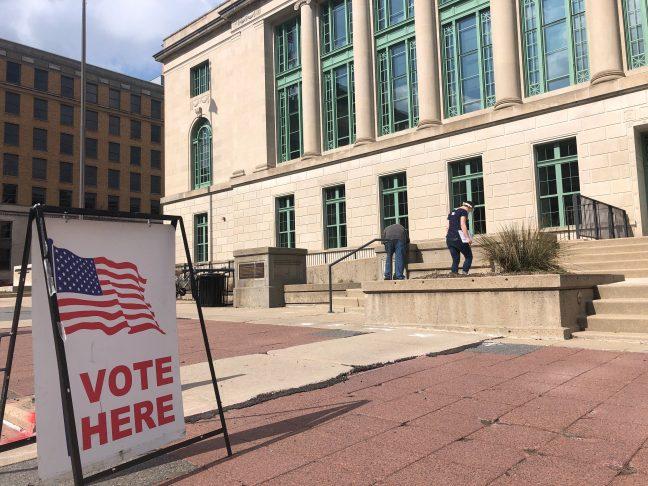Political science experts and poll workers are questioning how Wisconsin primaries during the pandemic affected the state-wide electoral process and its impacts on future voting policies.
Following the Wisconsin primary April 7 which proceeded amidst controversy and conflicting government actions, local voters confronted both new and old challenges as a result of government officials’ decision to continue with the Tuesday election despite the COVID-19 pandemic.
University of Wisconsin political science professor David Canon said in reviewing the scenario, many issues arose which should have prevented voting from happening.
“It is clear that we should not have had the election,” Canon said. “There should have been more time to give the ballots out and waiting would have been a safer option.”
To avoid health risks many citizens opted to send their vote in from home through absentee ballots, though issues arose when, throughout Wisconsin, more than 10,000 voters did not receive the absentee ballots they requested, the Wisconsin State Journal reported.
Canon said many citizens failed to receive an absentee ballot, including voters who sent them in ahead of time. In light of the circumstances, Canon said those who failed to receive ballots chose between going to the polls and risking their health or not voting at all.
“I requested my ballot three weeks before and it took 10 days, but I do know many people who did end up having to vote in person,” Canon said. “My brother-in-law’s sister requested her ballot three separate times and never got one and was forced to vote in person. ”
These stories of lost or undelivered ballots are not uncommon and add fuel to the fire of the controversy, The New York Times said. According to NYT, 9,000 absentee ballots were never sent, and many more were sent but never received to be counted.
In addition to issues with voters not having access to absentee ballots, there were instances of disqualified ballots, Wisconsin Public Radio reported. Wisconsin law requires a witness to sign in addition to the voter for the ballot to be eligible, and this may have deprived voters who live alone of the vote.
Though Wisconsin Judge William Conley’s order had some leeway with voters who do not have access to a witness signature due to the COVID-19 pandemic, most absentee ballots still required it, according to Vox. Canon said the processing and dissemination of ballots were major issues across the state.
“I actually hand-delivered my ballot because I did not want to run the risk of it getting lost in the mail,” Canon said. “I think in Appleton there were three bins that were not delivered.”
In addition to a witness signature, absentee ballots also require a photo ID, meaning some voters found it difficult to figure out how to vote and many relied on disability rights advocates to help secure the process for them, according to the Milwaukee Journal Sentinel.
For those who opted to journey to the polls to vote, certain areas such as Milwaukee were overwhelmed with long lines lasting hours, according to the Wisconsin State Journal. UW sophomore Daniel Ledin worked the polls in Madison and thought the city had a much better situation than most.
“I worked at the polls at Ward 51 at the Capitol Library,” Ledin said. “I found that Madison was a lot more prepared than other places, like Milwaukee. Workers had access to gloves, hand sanitizer, and there was plexiglass separating us from the voter. Because there were so many locations open, the lines were not a problem.”
Canon said Madison’s voting situation was better due to the increase of absentee ballots sent out. Additionally, they also received a record number of absentee ballots, helping reduce the flow of traffic to the polls.
Milwaukee is home to almost 600,000 citizens and only five out of 180 polling stations were open to the public, according to The Wisconsin State Journal. Madison, with around 260,000 people, had 66 out of 92 polling locations open. Ledin said the differences across municipalities reflect the long standing issues in the electoral process, amplified by the conditions of the pandemic.
“What I observed was, in Wisconsin, some parts were organized and some were not, which speaks more towards Wisconsin’s poor history with the electoral process,” Ledin said.
Looking forward, some lawmakers and citizens believe there should be improvements with the electoral process in Wisconsin as legal cases arise, according to the Wisconsin State Journal.
A group of 14 voters in Milwaukee filed a lawsuit following the election results, claiming they were disenfranchised, according to the Wisconsin State Journal. Additionally, state health officials connected 19 new cases of COVID-19 to voting activities during the primary so far, according to ABC News.
The election was not close and had a large margin of victory, so there should not be a basis for a recount, Canon said. As the COVID-19 pandemic persists, it continues to have large, universal effects on everyone and in all aspects of life. Canon said the state should prepare for the possibility of an election by mail in the fall if the pandemic presses on.
“We need to be ready for the entire election to be by mail,” Canon said. “We need to prepare for that possibility.”


